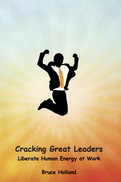The Power of Vulnerability
Cracking Great Leaders know themselves deeply; they know they are not perfect but they accept themselves as they are and are vulnerable enough to show themselves fully (including imperfections). They think: "I am worthy. I am enough." Interestingly, it is their imperfections that other people see and love, because it makes them 'real.'
Vulnerability is not a weakness. Indeed whenever we see someone vulnerable enough to show their human limitations we see it as pure courage. Think of anyone you respect and I bet they know their limitations and are quite prepared to laugh at themselves about them.
Other managers don't know themselves as well. It's not 'managerial' to be introspective. When I profile the managers of an organisation I usually find ‘doing’ is a far stronger characteristic than ‘being.’ When this is discussed everyone understands what ‘doing’ means (after all this is what managers do nearly 24/7), but often they have less understanding what ‘being’ means. It is like talking to a ‘human doer’ rather than a ‘human being.’
These managers think vulnerability is a weakness. They prefer to stay in control, by acting out an 'acceptable' role of what managers should be like: emotionally controlled, highly competitive, in pursuit of status. The result is inevitably colourless. Everyone is the same; there is no character because there are no imperfections.
Here are some ways to show vulnerability. Let go of who you think you should be and be yourself. Have the courage to ask for help. Say what you think and how you feel even when this may not be the norm. Say, 'sorry' when you make a mistake. Say: 'I don't know' when you don't. Say: 'Mary is better at this than me' when she is. Let go of control. Have the courage to show your imperfections. Laugh at yourself and others will laugh with you (not at you).
I am dyslexic. As long as I can remember I’ve got words mixed up. I push doors that says, 'Pull' and pull doors that say, “Push.” During my university English examination I wasted valuable time trying to work out how to spell 'who'. My wife tells me I am the only person she knows who has had to renew a library book on speed reading. All of this is potentially problematic since much of my work is based on words. I often find myself in front of senior managers writing their brainstormed ideas on a flip chart. I find it far easier to warn them of my 'creative spelling' before starting by telling them one of these stories. They laugh with me, but it never feels vindictive and they always end up on my side.
This is an extract from "Cracking Great Leaders", Page 155. The book is about how to release human energy at work. It views people and organisations as energy fields, deeper and stronger than most managers understand - way beyond strengths to Genius.
To see the contents and the first few pages, just click on the word 'Preview' below the image of the book at:
https://lnkd.in/bPv6Swn
Vulnerability is not a weakness. Indeed whenever we see someone vulnerable enough to show their human limitations we see it as pure courage. Think of anyone you respect and I bet they know their limitations and are quite prepared to laugh at themselves about them.
Other managers don't know themselves as well. It's not 'managerial' to be introspective. When I profile the managers of an organisation I usually find ‘doing’ is a far stronger characteristic than ‘being.’ When this is discussed everyone understands what ‘doing’ means (after all this is what managers do nearly 24/7), but often they have less understanding what ‘being’ means. It is like talking to a ‘human doer’ rather than a ‘human being.’
These managers think vulnerability is a weakness. They prefer to stay in control, by acting out an 'acceptable' role of what managers should be like: emotionally controlled, highly competitive, in pursuit of status. The result is inevitably colourless. Everyone is the same; there is no character because there are no imperfections.
Here are some ways to show vulnerability. Let go of who you think you should be and be yourself. Have the courage to ask for help. Say what you think and how you feel even when this may not be the norm. Say, 'sorry' when you make a mistake. Say: 'I don't know' when you don't. Say: 'Mary is better at this than me' when she is. Let go of control. Have the courage to show your imperfections. Laugh at yourself and others will laugh with you (not at you).
I am dyslexic. As long as I can remember I’ve got words mixed up. I push doors that says, 'Pull' and pull doors that say, “Push.” During my university English examination I wasted valuable time trying to work out how to spell 'who'. My wife tells me I am the only person she knows who has had to renew a library book on speed reading. All of this is potentially problematic since much of my work is based on words. I often find myself in front of senior managers writing their brainstormed ideas on a flip chart. I find it far easier to warn them of my 'creative spelling' before starting by telling them one of these stories. They laugh with me, but it never feels vindictive and they always end up on my side.
This is an extract from "Cracking Great Leaders", Page 155. The book is about how to release human energy at work. It views people and organisations as energy fields, deeper and stronger than most managers understand - way beyond strengths to Genius.
To see the contents and the first few pages, just click on the word 'Preview' below the image of the book at:
https://lnkd.in/bPv6Swn
